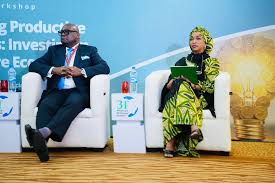Economic stakeholders have emphasised the need to translate ongoing macroeconomic reforms into tangible benefits for Nigerians, as part of efforts to achieve inclusive growth and shared prosperity.
The call was made during a panel discussion at the launch of the World Bank’s Nigeria Development Update (NDU) Report for October 2025, themed “From Policy to People: Bringing the Reform Gains Home”, held in Abuja on Wednesday.
Minister of Finance and Coordinating Minister of the Economy, Wale Edun, said Nigeria’s economy was showing positive signs of recovery, but the real challenge was ensuring that reform dividends reached ordinary citizens.
Edun disclosed that the National Economic Council (NEC) had approved a ward-based development programme across 8,809 wards, aimed at directly supporting the poorest and most vulnerable populations.
“The initiative, sanctioned by President Bola Tinubu, will identify economically active individuals in each ward and provide them with finance, training, and access to development partners,” Edun said.
“This is how we connect reforms to real lives—ensuring that all Nigerians participate in the positive trajectory of the economy.”
He added that the government’s social safety net initiative was already supporting 10 million households, with plans to reach 15 million by the end of 2025.
Central Bank of Nigeria (CBN) Governor, Olayemi Cardoso, represented by Phillip Ikeazor, Deputy Governor for Financial System Stability, commended the World Bank for recognising efforts to curb inflation.
“As inflation moderates, interest rates are expected to decline, making credit more affordable and stimulating economic activity,” Cardoso said.
He noted that closer coordination between fiscal and monetary authorities, alongside fintech expansion, open banking, and bank recapitalisation, would deepen access to credit and boost private-sector participation.
Governor Abdullahi Sule of Nasarawa State highlighted human capital development as key to sustaining growth, citing the establishment of a skill acquisition centre that had trained over 8,000 people.
Sule added that the state had introduced an executive order requiring mining companies to process minerals locally, thereby creating jobs and promoting industrial growth.
“These policies are empowering our people, encouraging entrepreneurship, and reducing dependence on government employment,” he said.
On his part, Ebele Enunwa, Managing Director of Sundry Markets Ltd, said that Nigeria was becoming increasingly self-reliant, with more locally made products emerging across sectors.
“We cannot continue to depend on a mono-product economy,” Enunwa said.
“Building capacity across different sectors will help Nigeria generate its own foreign exchange and fully reap the gains of reform.”
The session concluded with a shared consensus among participants that sustaining policy consistency and expanding access to economic opportunities were vital to translating macroeconomic stability into improved living standards for Nigerians.





